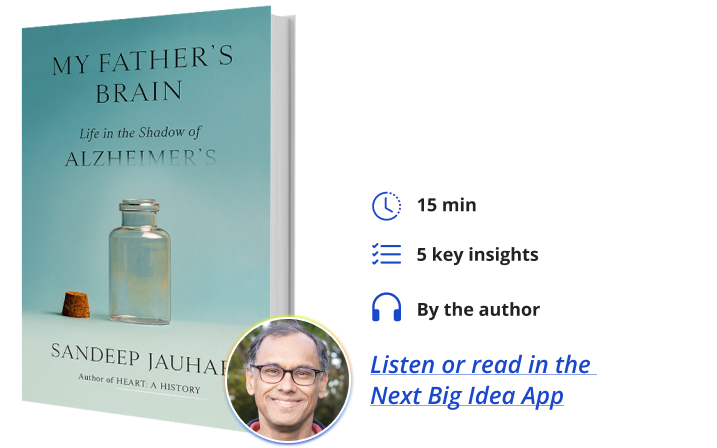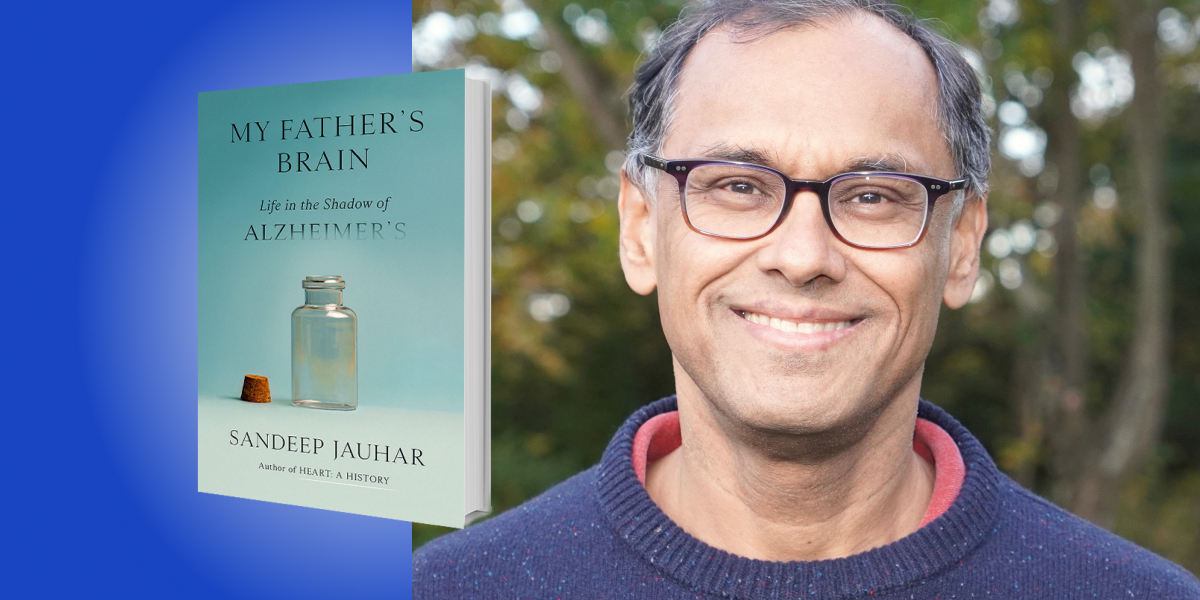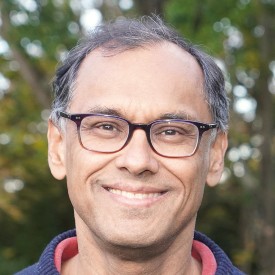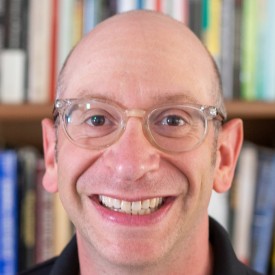Sandeep Jauhar is a New York Times bestselling author and a practicing cardiologist. He writes regularly for the New York Times and has appeared on National Public Radio and MSNBC. His essays have been published in The Wall Street Journal, Time, and Slate.
Below, Sandeep shares five key insights from his new book, My Father’s Brain: Life in the Shadow of Alzheimer’s. Listen to the audio version—read by Sandeep himself—in the Next Big Idea App.

1. We live in a hypercognitive world.
My father became cognitively impaired in what has been called a hypercognitive world. In this world, swirling with information, we prioritize intellect and reason as predominant virtues. If you do not possess these virtues, you are marginalized. If you can’t follow or add to the endless conversation, you are rendered invisible. So, when my father’s cognition degenerated, he became largely invisible to the outside world.
This happened to my father in his own family, too. I wish I could say that we were more patient than the world outside, but we weren’t. The Etch-a-Sketch that was his Alzheimer’s mind trapped him in a perpetual present, and his children in perpetual frustration. “He is helpless.” “He won’t remember.” “He is like a child now.” We would say those things in front of him, sometimes even to him. There was little to deter us, even as we regretted it, again and again, after the fact. We knew that our father was more than just his damaged brain, we knew it, but we struggled to believe it.
2. Social isolation may accelerate cognitive decline.
The risk of Alzheimer’s is twice as high in the loneliest persons as compared with those who have the most social support. Even after controlling for other factors, such as cognitive and physical activity, neuropathology is not the sole driver of clinical dementia.
“However, what is rarely acknowledged is the vital role of “psychosocial reserve,” relationships, environment, and family support.”
Moreover, brain damage and the degree of clinical dementia are not as strongly correlated as one might expect. Patients with only a small amount of brain damage often have “excess disability” out of proportion to their neurological impairment. The converse is also true: Patients with an excess of brain damage may be surprisingly cognitively intact. The usual explanation for this discrepancy is “cognitive reserve” or higher educational levels, prior intelligence, and so on. However, what is rarely acknowledged is the vital role of “psychosocial reserve,” relationships, environment, and family support. Studies have shown that this may be just as important in Alzheimer’s disease as neuropathology.
3. Having a sick and elderly loved one is often a full-time job.
When our parents got sick, my siblings and I joined the ranks of the 15 million or so unpaid (and untrained) family caregivers for older adults in this country. The busiest half of this largely invisible workforce spends, on average, nearly 30 hours a week providing care to relatives. Many of these relatives have dementia and it amounts to more than $400 billion worth of annual unpaid time. The work takes its toll and these relatives are at increased risk of developing depression, as well as physical and career difficulties, including loss of job productivity. Being sick and elderly in this country can be terrifying, and having a sick and elderly loved one is a full-time job.
In the U.S., government support for dementia care is largely nonexistent. Of the $200 billion in total annual costs for dementia care, Medicare pays only $11 billion. The shortfall is covered by families, to the tune of $80,000 per family per year—almost double the outlay for cancer or heart disease. Long-term care insurance may help with this burden; however, most Americans don’t own, or cannot afford such policies. Therefore, most of the burden of elder care ends up being borne by family caregivers, unless families can afford to hire private help.
4. In dementia care, sometimes you have to lie.
When my father was declining from Alzheimer’s disease, one of the things my siblings and I used to argue about was how much to correct or accommodate his confusions. For example, my father, in his impaired state, expected his live-in aide to work for free and would lash out at her (and us) whenever he learned that she had been paid. My siblings tended to think that it was fine to lie to him and tell him she was receiving no money from us. More pragmatic than I, they had no reservations about employing deception to help our father (and themselves) get through one of his rancorous moods.
“Personal ethics, I discovered, may come into conflict with the reality of caregiving.”
I fought against this practice as a matter of principle. To me, a healthy relationship with our father, even in his debilitated state, could only be based on truth and trust. Little lies, even if told with the best of intentions, would erode what little connection we had left with him.
However, while doing the hard work of caring for my father, I came to learn that truth-telling can be a double-edged sword. I came to understand that the relationship between ethics and treatment in dementia is a complicated one. The demands of truth-telling exist in tension with other moral imperatives, such as a son’s obligation to do the best for his declining father. Personal ethics, I discovered, may come into conflict with the reality of caregiving.
I remember one day after my father kicked his caregiver out of the house, I took her back to him. I knew that if she left, that would surely be the end of my father’s independent living. He would undoubtedly end up in a locked memory unit like so many dementia patients.
“Look, Dad, Harwinder came back,” I said. He eyed her suspiciously.
“She says she is sorry,” I said. “She told me she will work for free. No money. Just food and shelter.”
His face relaxed, and I discerned a faint smile. “Okay,” he said, “Please come in.”
5. Memories are malleable.
I remember so many details from our first year in America, nearly five decades ago, when I was just eight years old. There was a lawn mower in the backyard whose engine imprinted a coin-sized burn on my thigh. There was a small woodshed that housed shovels, gardening tools, and various rusted hulks. In the middle of the yard was a grand oak tree with a tire swing. I can still see my father sitting on a lawn chair under that tree, his fingers caked with soil, his cold beer trickling condensation, predicting how bountiful the harvest would be that fall.
“Through coherence, our memories are reconstructed to support our current values or beliefs and these beliefs may not allow us to see things the way they really happened.”
But did it all really happen this way? Was the garden really visible through the kitchen window? Was that window really framed by frilly white curtains? Memory construction, psychologists say, involves a tension between two opposing principles. Correspondence tries to force our memories to agree with the original event that we experienced. It is how most of us view memory: as a true reproduction of something that occurred in the past.
The principle of coherence, on the other hand, transforms our memories to make them consistent with the way we see ourselves and the world in the present. Through coherence, our memories are reconstructed to support our current values or beliefs and these beliefs may not allow us to see things the way they really happened. Those kitchen curtains may now be white to reflect the nostalgia with which I reflect, 45 years later, on my family’s first year in America. Hence, autobiographical memories involve a balance of two conflicting forces, one aiming to represent the past the way it was, the other aiming to reconstruct the past in the way that we need to see it today.
To listen to the audio version read by author Sandeep Jauhar, download the Next Big Idea App today:
































